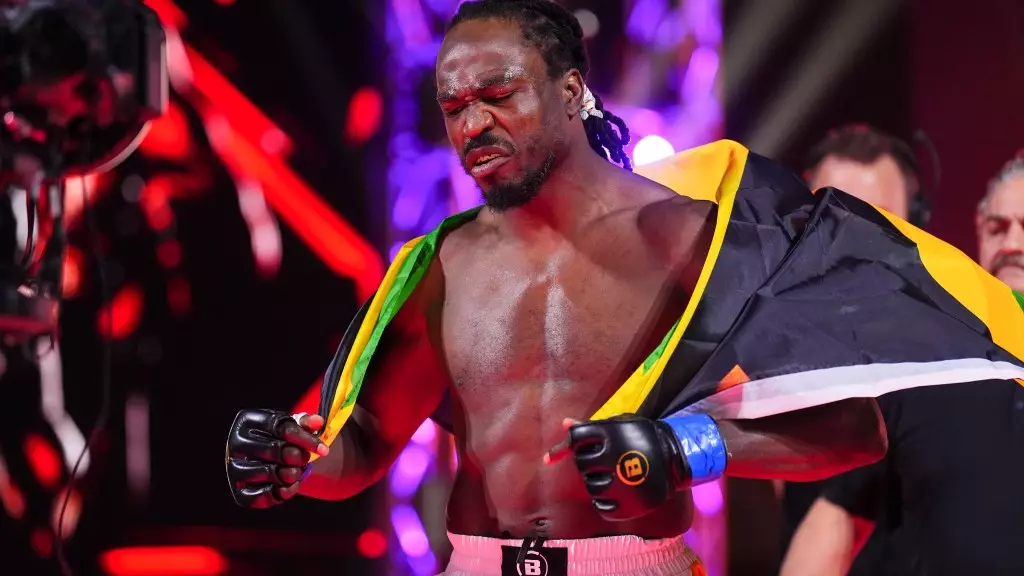Jason Jackson’s name is about to echo through the mixed martial arts (MMA) community once again as he gears up for the 2025 PFL welterweight tournament. With a record of 18 wins and five losses, Jackson is not just another contender; he’s a former Bellator champion with a lot to prove. This upcoming tournament has taken on added significance for him, as it represents not only another opportunity to reclaim glory but also a personal testing ground for resilience and adaptability in the face of adversity.
Competing alongside fellow seasoned fighters like Andrey Koreshkov and Logan Storley, Jackson enters a high-stakes scenario where expectations will undoubtedly weigh heavily on him. As a former titleholder who claimed the Bellator belt by knocking out Yaroslav Amosov in Bellator’s last event before the transition to PFL management, Jackson’s motivation transcends the typical competitive spirit. It manifests from an introspective place—his need to validate his status as a champion against a backdrop of internal chaos in the organizations he represents.
The pressure mounts when considering Jackson’s past experiences—most notably his recent bout against Ramazan Kuramagomedov. Despite losing that fight in a closely contested split decision, Jackson felt the context of the match had more bearing on the outcome than his performance itself. He described the circumstances leading up to that fight as “the worst circumstance I’ve ever been under in my life of fighting.” Acknowledging that he was jet-lagged and rushed to fulfill media obligations while struggling with weight management, Jackson’s criticisms of the fight highlight a vital point: the significance of fair conditions for athletes competing at this level.
Jackson’s struggles resonate widely within the MMA community, where fighters often contend with not just opponents but external factors that can derail their performance. His narrative illuminates the sacrifices fighters make—ridiculously tight schedules, unforeseen obstacles, and pressure from promotional entities—to simply step into the cage. Jackson’s frustrations are further amplified by the acute awareness that unlike him, Kuramagomedov arrived in Ireland ten days prior, a clear advantage that played a role in Jackson’s subpar performance.
The emotional toll such challenges exact on athletes cannot be understated. Jackson’s admission of fighting out of anger and frustration speaks volumes about the psychological aspects of competitive fighting. The anecdote of having suffered injuries due to fighting in a heightened emotional state emphasizes the need for mental clarity and control. Fighting angry has proven detrimental in his previous experiences, leading to injury and, ultimately, loss. Recognizing these patterns, Jackson is focused on channeling that frustration into a more constructive mindset as he prepares for the upcoming fights.
The tournament’s location in Orlando, Florida, presents a revitalizing change for Jackson. Training at Kill Cliff FC in South Florida enables him to fight closer to home, potentially alleviating some external stresses he faced leading up to previous matches. He recognizes the psychological relief of competing in familiar surroundings. This can serve not only as a physical boost but a mental one as well, allowing him to focus entirely on what matters: his performance in the cage.
This shift in environment could be a pivotal aspect of his strategy. With the benefit of familiarity on his side, Jackson can engage in a training regime free of those disruptive variables that hindered him before, like travel fatigue and unexpected complications surrounding immigration. Coupled with a renewed clarity of mind, he should be poised for a fresh start and a stronger showing.
As Jackson stands on the precipice of another chapter in his career, he is keenly aware of the myriad challenges he faces—not just from formidable opponents but from navigating the turbulent waters of professional MMA. His past experiences will undoubtedly inform his approach to the upcoming tournament. Scott Coker’s departure from Bellator and the ongoing evolution of the PFL create a landscape that is uncertain yet ripe with opportunity.
It’s evident that Jackson is ready to transform challenges into stepping stones for future success. Embracing a mindset rooted in flexibility and self-awareness could redefine his trajectory, with the potential to reclaim his status as not just a contender but as a lasting force in the sport. As he prepares for this journey, fans and analysts alike will be watching closely—anticipating what Jason Jackson will bring to the cage next.

